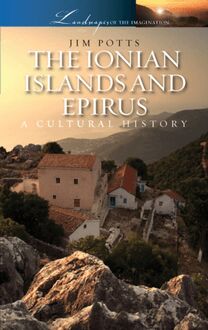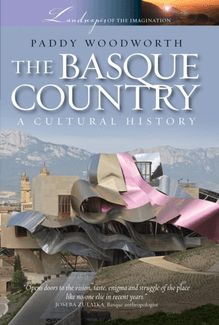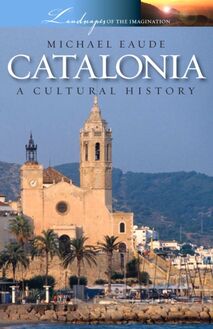Basque Country , livre ebook
182
pages
English
Ebooks
2012
Vous pourrez modifier la taille du texte de cet ouvrage
Obtenez un accès à la bibliothèque pour le consulter en ligne En savoir plus
Découvre YouScribe en t'inscrivant gratuitement
Découvre YouScribe en t'inscrivant gratuitement
182
pages
English
Ebooks
2012
Vous pourrez modifier la taille du texte de cet ouvrage
Obtenez un accès à la bibliothèque pour le consulter en ligne En savoir plus
Publié par
Date de parution
10 janvier 2012
Nombre de lectures
0
EAN13
9781908493224
Langue
English
Poids de l'ouvrage
1 Mo
Publié par
Date de parution
10 janvier 2012
Nombre de lectures
0
EAN13
9781908493224
Langue
English
Poids de l'ouvrage
1 Mo
Title Page
THE BASQUE COUNTRY
A Cultural History
By
Paddy Woodworth
Publisher Information
First published in 2007 by
Signal Books Limited
36 Minster Road, Oxford, OX4 1LY
www.signalbooks.co.uk
Digital edition converted and distributed in 2012 by
Andrews UK Limited 2012
www.andrewsuk.com
© Paddy Woodworth, 2007
The right of Paddy Woodworth to be identified as the author of this work has been asserted by him in accordance with the Copyright, Design and Patents Act, 1988.
All rights reserved. The whole of this work, including all text and illustrations, is protected by copyright. No parts of this work may be loaded, stored, manipulated, reproduced or transmitted in any form or by any means, electronic or mechanical, including photocopying and recording, or by any information, storage and retrieval system without prior written permission from the publisher, on behalf of the copyright owner.
Cover Design: Baseline Arts
Cover Images: Lurrak/Manuel Díaz de Rada, Paddy Woodworth, Luis Alberto García
Photographs: Lurrak/Manuel Díaz de Rada pp.i, xvii, 2, 12, 64, 69, 94, 97, 136, 140, 214, 238; Paddy Woodworth pp.xxi, 53, 74, 82, 131, 142, 160, 169, 190, 233, 246, 263, 270; Lurrak/Jon Benito p.7; Courtesy Sogecine p.30; Luis Alberto García pp.38, 104, 172, 178; Lurrak/Jaqoba Zenon p.48; Courtesy Bernardo Atxaga p.147; Lurrak/Josu Zulaika p.205; Lurrak/Javier Arizabalo p.242; Jaime Roset/istockphoto p.257
Please note page numbers refer to the printed edition of this title.
Dedication
To my late parents,
Phyllis and Dudley Woodworth,
with love and happy memories
Acknowledgements
Frank advice is a very rare thing, and should be acknowledged first. A meticulous historian, Selma Huxley, was working on a TV documentary in the Basque County in the spring of 1979. One day she needed an urgent film delivery, and a friend and I agreed to help out. But it so happened that this was the day of a general strike, in response to a killing by the Guardia Civil. Political strikes were a serious business in those days. The main roads had been blocked by protesters, and there were police checkpoints everywhere. But she needed the film badly so, feeling alternately like strike breakers and subversives, we took dozens of back roads and made our delivery, with a scare or two along the way. High on adrenalin, and getting higher on the excellent wine she offered us, I blurted out that I wanted to write a book about the Basque Country. I had barely published two articles at that stage, and she looked at me coolly but not unkindly. Her advice was succinct: “Perhaps you should give it another ten years.” I took the point, and ended up giving it nearly three decades. I am grateful that she stopped me then in my over-eager tracks. I am not at all sure now that I don’t need another lifetime to get it half-way right, so I still await her judgement with trepidation.
All of the people who have helped and informed me so generously since I first went to the Basque Country in 1975 have made a contribution to these pages. To list them all is beyond both my memory and the space available, and I must beg the forgiveness of those who are omitted, and thank them for their essential if anonymous assistance.
There are several people without whom this book would not have happened, at least in its current form, and to whom I would like to give special mention. Stephen Hayward kindly recommended me to Signal, and for good or ill Michael Dwyer and James Ferguson took his advice. I am deeply grateful to them for the opportunity to write this kind of book about a country I love so much. Not many publishers, especially in these mean and mercenary times, tell a writer to “follow your own obsessions”, as James did. That’s a brave - and scary - instruction, and I hope it, and all his subsequent patience, have been fruitful. And, by way of a Stop Press, many thanks to Devdan Sen for his fine production work, and Kathleen May and, very especially, Kate Bowe, for their work on publicity.
Txomin Artola has been an invaluable friend and informal guide in matters Basque since we met in 1979. Joseba Zulaika’s books have long offered me a most fruitful and provocative analysis of Basque culture. I am very lucky that he has also offered me tremendous encouragement (a writer’s greatest external need), as well as unstinting assistance with endless queries, over the last two years. Bernardo Atxaga’s novels and essays have nourished me for many years with a different register of insights, and in the few months since we have met he has also been extraordinarily generous with his time, his library and his insights.
Txema Montero and Irune Zuluaga of the Fundación Sabino Arana were unstintingly helpful in providing invaluable local contacts for my research on fiestas (a not altogether painful task, as you may gather). Txema and his wife Marivi Larrauri offered me generous hospitality besides, and Txema took me on a remarkable walk around the summit of Amboto with his hill-walking cuadrilla .
There was a welcoming glass, a full table and a warm bed at the home of Joe Linehan, his wife Cristina Martín, and their daughter Sinéad in Hernani, whenever I buckled before the open road. Joe, Alan Griffin, Toni Strubell and Alberto Letona were kind enough to share their own very rich experience of the Basque Country with me. José Ignacio and María Pilar, who are too modest to let me use their surnames, also offered me an open house, and took me into corners of Euskal Herria I would never have found on my own.
Pello Elzaburu brought me on a most fruitful drive from one end of Navarre to the other at very short notice. Kepa Aulestia and Teresa Casanovas gave me privileged access to the Vizcayan mining villages. My brother-in-law, Pa Duhig, read several chapters with perspicacity at a difficult time. Jesús Albores gave me invaluable help from the archives of El País . Igone, Carlos, Carmen and all the staff at the delightful Iturrienea Ostatu in Bilbao always gave me the warmest of welcomes.
And here I would also like to acknowledge some very old debts: Mertxe Etxebeste and Txanan Álvarez took a young journalist off the streets and into their home in Irún nearly thirty years ago. My career in the Basque Country might well have been stillborn without the welcome sanctuary they provided over several years. Iñigo Ciriquain and Margarita Echeverria were unfailingly kind neighbours to me in this period also.
I would like to express my warm thanks to the many people who speak to me in the pages that follow. Their generosity with their time and knowledge was invaluable. Other individuals not mentioned the text also made helpful contributions in various ways: Pello Andonegi; Iñaki Antigüedad; Bixente Arozena; Idoia Arrizabalaga; Jaione Arrasate; Maribel Benito; José Luis de la Granja; Gustavo de Arístegui; Lisa Doherty; Mike Eaude; Anton Erkoreka; Peio Etcheberry-Ainchart; Mertxe Ezeiza; Genoveva Gastaminza; Aitor Guenaga; José Luis Goikoetxea and his colleague Fernando; Txaro Goñi; Aitor Guenaga; Iñigo Gurruchaga; Andreas Hess; John Holmwood; Helen Jones; Kontxi Irizar; José María Kazalis Eiguren; Javier Landa; Ander Landaburu; Gorka Landaburu; Xabier Lapitz; Alex Longhurst; Maud McKee; José Luis Mendoza; Juan Fermín Michelena; Ángel Luis de Miguel; Sagrario Morán; Pedro Oiarzabal; Xabier Olaizola; Pablo Otaola; Begoña Sagasti; Francisca Segura; Aurora Sotelo; Rob Stone; Sue Tucker; Cyril Peyramond; Eamonn Rodgers; Laura Yanci; Mertxe Zabala Odiaga.
Luis Alberto García was exceptionally generous in supplying excellent photographs, and I would also like to thank Manuel Díaz de la Rada, Jesús Uriarte and the other photographers at www.lurrak.com for their fine images. Likewise Sebastian Ballard for his work on the map.
No-one who helped me bears any responsibility for any views expressed by me in this book, nor for how their own views are presented, nor for any errors which may arise. Most of them will disagree with some things I say, and some of them will disagree with almost everything. I can only fall back on William Blake’s bracing aphorism: “Opposition is true friendship.”
My thanks to my late parents, Phyllis and Dudley Woodworth, to whom this book is dedicated, who always encouraged me to write “a travel book”. I wish they had lived to hold it in their hands. Finally, no words can express my gratitude to my wife, Trish Long, whose love and support are the kind of bedrock all writers need, and very lucky writers find.
Paddy Woodworth
Stoneybatter
Dublin
May 2007
www.paddyworth.com
Preface
The Basque Country has had more than its fair share of stereotypes thrust upon it. The Basques have sometimes resisted this typecasting, but they have not been shy about making their own contributions, some as extravagant as any foreigner’s, to stock images of their homeland.
Even before Victor Hugo described the Basques as “the people who sing and dance at the foot of the Pyrenees” - a cliché which makes many Basques apoplectic today - the region had become a magnet for professional and amateur seekers after exotic folklore and unique customs. As “Europe’s aboriginals”, all things Basque were seized upon as ancient and original. Basque nationalism, a relatively recent invention, has avidly cultivated some of these stereotypes, stressing those aspects of culture which made the Basques distinct from the Spanish and the French.
However, archaeologists, anthropologists, folklorists and nationalists have not flourished here






